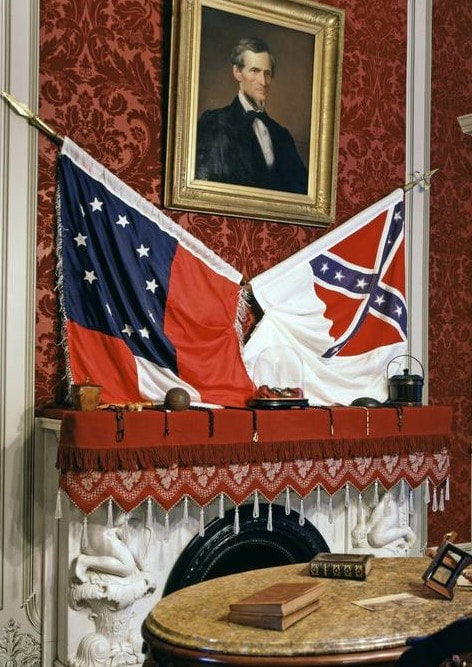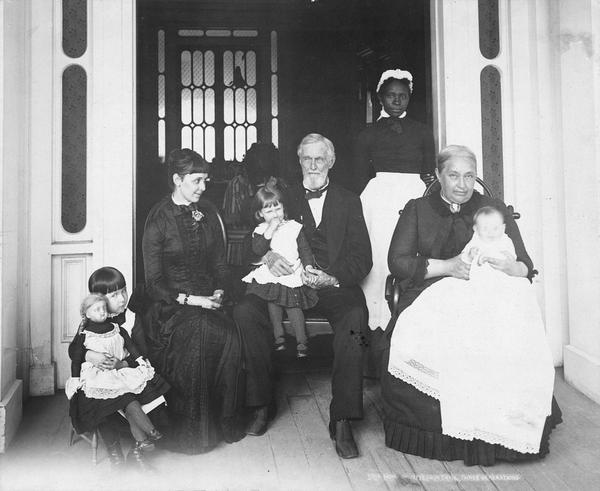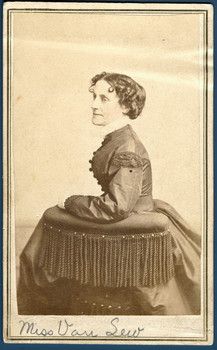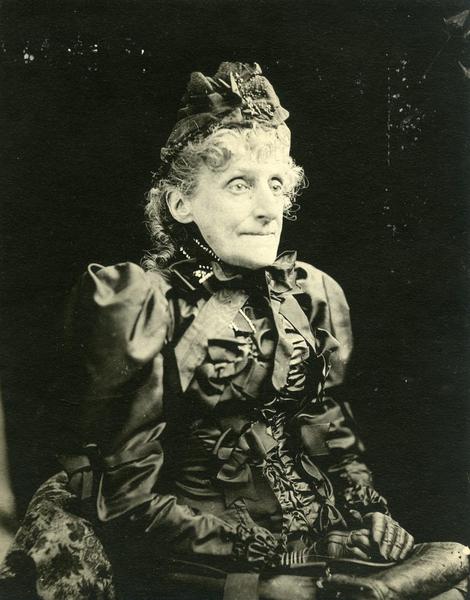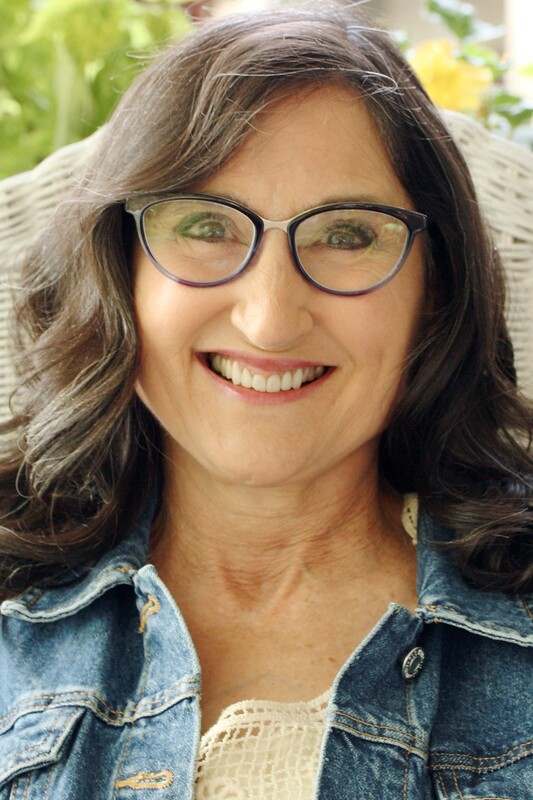|
Hundreds of women spied during the Civil War, but as far as we know, only one gathered intelligence inside the house of Jefferson Davis, the Confederate president. Mary Elizabeth Bowser, born enslaved to the prominent Van Lew family in Richmond, Virgina, worked with one of the Union Army's most intricate spy rings. It was operated by a shrewd Richmond society woman pretending to have lost her mind, so as to escape suspicion among the city's pro-slavery upper crust. Elizabeth “Crazy Bet” Van Lew started unofficially spying for the North while bringing food and medicine to Union prisoners housed in Richmond, passing notes and helping the men with plans to escape. As Elizabeth Van Lew expanded her espionage, she saw great possibilities for Mary Browser. We know only the basic outlines of Mary Browser's life. There are no photographs of her, but... one of her nicknames was "Little Mary" and she was reported to be sarcastic and humorous. Born enslaved to the wealthy hardware merchant John Van Lew, Mary was freed as a three-year-old when John died and the Van Lew women freed all their slaves. John's daughter Elizabeth Lew had been educated in Philadelphia where she formed abolitionist views. When Mary was old enough, Elizabeth sent her to Philadelphia to be educated, a rare opportunity for southern blacks at the time. By the start of the Civil War in 1861, Mary had returned to Richmond and soon Elizabeth recruited her as a spy and helped her get work as a domestic in the home of President Jefferson Davis and First Lady Varina Davis. It must have been galling for Mary, a free and educated woman, now having to act like a less-than-bright and slightly unbalanced servant. But this allowed her to listen in on important conversations between President Davis, his staff, generals and politicians. Her housekeeping chores gave her access to Davis's desk and his papers, including correspondence, troop movements, war plans and economic information.
Mary worked full time in the Davis household, cleaning and serving meals for nearly the entire war. One of her contacts to which she passed information was Thomas McNiven, a Scottish-American baker whose deliveries took him throughout the city providing him great cover for meeting and talking to people. He wrote in his memoirs, Mary "had a photographic mind. Everything she saw on the Rebel President's desk she could repeat word for word. Unlike most colored, she could read and write. She made the point of always coming out to my wagon when I made deliveries at the Davis' home to drop information." Jefferson Davis knew he had a mole in his house, for there was a steady trickle of intelligence dripping from the confederate's highest echelon. Of course, he wouldn't suspect a black woman whom he considered a dim-witted, less-than-human. As a black servant woman, Mary was able to pass intel to Elizabeth Van Lew without suspicion. In addition, Elizabeth managed about a dozen spies in Richmond, who sometimes used invisible ink, which only revealed its secrets when milk was poured on the paper. Elizabeth wrote in her diary, “When I open my eyes in the morning, I say to the servant, ‘What news, Mary?’ and my caterer never fails! Most generally our reliable news is gathered from negroes, and they certainly show wisdom, discretion and prudence, which is wonderful.” And Mary was not the only African American working to thwart Confederate strategies. "The chief source of information to the enemy," said General Robert E. Lee, commander of the Confederate Army, in May 1863, "is through our negroes." It's difficult to trace Mary's life after the war, but we know, like many freed blacks she struggled to find employment. She started a school for blacks in Georgia in early 1867, teaching all the students herself, days, evenings and Sunday school, to children and adults. There's evidence she traveled around using aliases and telling her story. The clipping below appeared in a column of General City New between Collison in the Harbor and Robbery in Twelfth-Street, September 10,1865, in The New York Times. The U.S. Government inducted Mary Elizabeth Bowser into the Military Intelligence Corp Hall of Fame in 1995 to honor her service in the Civil War. And what about Elizabeth Van Lew? Apparently, when the war ended, she recieved personal thanks from Union General Ulysses S. Grant. “You have sent me the most valuable information received from Richmond during the war,” he reportedly told her. But in her hometown of Richmond, Elizabeth was "shunned her like the plague," according to Van Lew's family doctor and she was taunted by children who called her a witch. She was appointed to postmaster of Richmond, in 1869, by U.S. President Ulysses S. Grant as a reward for her wartime espionage. She used her position to help improve the city's postal system and to give jobs to blacks. She also opened a library for Blacks in Richmond and supported woman suffrage. Both of these intelligent and enterprising women were not able to fully realize their potential within the limits of 19th Century America, but what they did with the opportunities they made for themselves was remarkable. Remembering their courage and ingenuity can inspire us to push the limits of our 21st Century societal norms. Sources
https://www.cbsnews.com/news/slaves-freedmen-spied-on-south-during-civil-war/ https://www.smithsonianmag.com/history/elizabeth-van-lew-an-unlikely-union-spy-158755584/ https://www.history.com/news/female-spies-civil-war-mary-bowser-elizabeth-van-lew https://www.theroot.com/mary-bowser-a-brave-black-spy-in-the-confederate-white-1790859146 https://encyclopediavirginia.org/902hpr-4228645a0a78156/ Comments are closed.
|
I'm fascinated to discover little-known history, stories of people and events that provide a new perspective on why and how things happened, new voices that haven't been heard, insight into how the past brought us here today, and how it might guide us to a better future.
I also post here about my books and feature other authors and their books on compelling and important historical topics. Occasionally, I share what makes me happy, pictures of my garden, recipes I've made, events I've attended, people I've met. I'm always happy to hear from readers in the blog comments, by email or social media. Archives
September 2023
Categories
All
|
